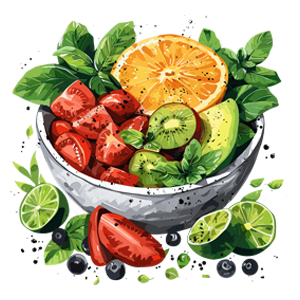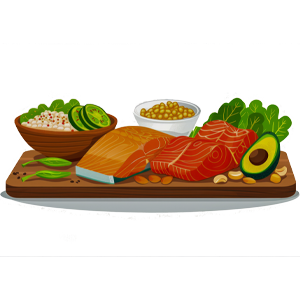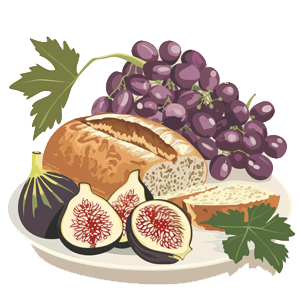Healthy Living
Keep Your Heart Happy on Three Special Diets
Keeping your heart healthy while following unique dietary restrictions, such as Mediterranean, plant-based and DASH diets, can be overwhelming. Although these popular diets promote heart health and reduce the risk of cardiovascular disease, understanding the nutritional requirements for heart health and ensuring your diet remains balanced, nutrient-dense and tailored to your needs are vital to a successful eating plan.
Whether you are transitioning to one of these diet plans or already following one, here are some heart-smart tips to stay on top of your cardiovascular health while adopting a Mediterranean, plant-based or DASH diet lifestyle.
The Mediterranean Diet The Mediterranean diet is based on the traditional eating habits of countries bordering the Mediterranean Sea. Although eating styles vary across these regions due to differences in culture, geography and agriculture, there are common elements. Key elements of the Mediterranean diet include:
|
|
How to Stay Heart-Healthy:
To stay heart-healthy with the Mediterranean diet, focus on limiting foods like sweets, red meat, fatty or processed meats, salt, processed foods and saturated fats. Since the diet involves less red meat, consume iron-rich alternatives like fortified whole grain cereals, oysters, white beans, lentils, spinach and tofu. Additionally, choose low-fat or fat-free dairy products to maintain adequate calcium levels while adhering to the diet.
Recipe: Italian Caprese Avocado Toast
Try our Mediterranean-inspired avocado tomato toast recipe that blends creamy avocado, fresh basil and juicy tomatoes on whole-grain bread. Topped with fat-free mozzarella and a drizzle of balsamic vinegar, this heart-healthy recipe is perfect for a Mediterranean-style breakfast or light snack.
Plant-Based Diet A plant-based diet eliminates meat and includes vegetables, whole grains, nuts and legumes. It cuts out animal-based products like beef, pork and full-fat dairy, which are high in saturated fats. Saturated fats raise LDL cholesterol, increasing the risk of heart disease and stroke. By reducing saturated fat intake, a plant-based diet can lower LDL cholesterol and decrease the risk of heart disease. There are several variations of plant-based diets. Each variation can be tailored to individual preferences and goals:
|
|
How to Stay Heart-Healthy:
To stay heart-healthy with a plant-based diet, ensure you still get essential nutrients like protein, vitamin B12 and calcium, as reducing meat and dairy can lead to deficiencies. Start with one meatless weekly meal as you gradually reduce your meat intake and fill most of your plate with plant-based vegetables and ingredients. Regular check-ups with your doctor to monitor vitamin and mineral levels are recommended.
Recipe: Yummy Guilt-Free Caesar Salad
Enjoy a delicious Caesar salad without the guilt! This recipe makes for a nutritious, heart-healthy meal or snack with a light dressing and fresh ingredients.
DASH Diet The DASH (Dietary Approaches to Stop Hypertension) diet is designed for people with high blood pressure. It focuses on reducing salt intake while increasing the consumption of fruits, vegetables, whole grains, low-fat dairy and lean protein. The recommended daily sodium intake for most adults is 2,300 milligrams. The DASH diet helps reduce body fluid retention and lower blood pressure by eating less salt. Planning meals requires attention to hidden sources of sodium, especially in takeout food, as high sodium levels can lead to increased fluid and blood pressure. |  |
How to Stay Heart-Healthy:
To stay heart-healthy with the DASH diet, make gradual changes to ease the transition. These small changes can help you gradually adopt a heart-healthy DASH diet:
- Start small: Add servings of vegetables, fruits and low-fat dairy like milk or yogurt to your meals or snacks, introducing one food group at a time.
- Vary your protein: Include a variety of protein sources and aim to eat fish at least once or twice a week.
- Make substitutions: Swap refined grains for whole grains, such as replacing white bread with whole-grain wheat bread.
- Stock nutritious snacks: Keep healthy options like fresh fruit, nuts, rice cakes, unsalted popcorn and low-fat yogurt on hand.
Recipe: Grilled Lemon-Garlic Chicken with Grilled Okra
Start your heart-healthy journey with this simple DASH-diet-friendly meal that features zesty citrus chicken paired with crunchy, grilled okra for a flavorful and nutritious dinner.
In Conclusion
The Mediterranean, plant-based and DASH diet focus on whole foods, healthy fats and reducing harmful ingredients like sodium and added sugars. Whether you adopt a specific diet or incorporate elements from all three eating plans, you can build a lifestyle that provides lasting health benefits to your heart. However, before you start a new diet, talk to your healthcare provider to help you choose a program that is right for you.



